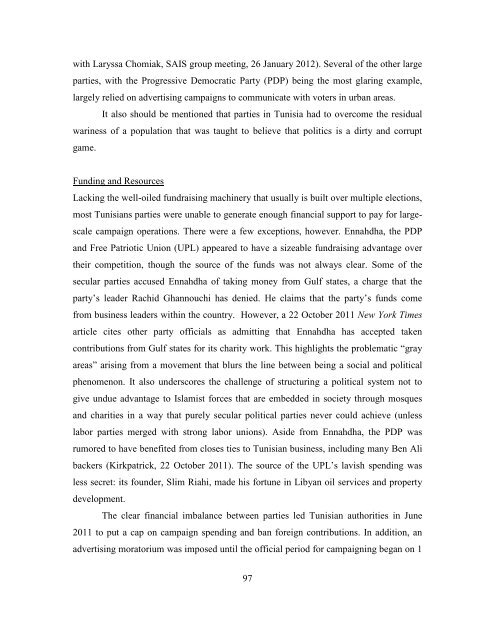Tunisia: Understanding Conflict 2012 - Johns Hopkins School of ...
Tunisia: Understanding Conflict 2012 - Johns Hopkins School of ...
Tunisia: Understanding Conflict 2012 - Johns Hopkins School of ...
Create successful ePaper yourself
Turn your PDF publications into a flip-book with our unique Google optimized e-Paper software.
with Laryssa Chomiak, SAIS group meeting, 26 January <strong>2012</strong>). Several <strong>of</strong> the other large<br />
parties, with the Progressive Democratic Party (PDP) being the most glaring example,<br />
largely relied on advertising campaigns to communicate with voters in urban areas.<br />
It also should be mentioned that parties in <strong>Tunisia</strong> had to overcome the residual<br />
wariness <strong>of</strong> a population that was taught to believe that politics is a dirty and corrupt<br />
game.<br />
Funding and Resources<br />
Lacking the well-oiled fundraising machinery that usually is built over multiple elections,<br />
most <strong>Tunisia</strong>ns parties were unable to generate enough financial support to pay for largescale<br />
campaign operations. There were a few exceptions, however. Ennahdha, the PDP<br />
and Free Patriotic Union (UPL) appeared to have a sizeable fundraising advantage over<br />
their competition, though the source <strong>of</strong> the funds was not always clear. Some <strong>of</strong> the<br />
secular parties accused Ennahdha <strong>of</strong> taking money from Gulf states, a charge that the<br />
party’s leader Rachid Ghannouchi has denied. He claims that the party’s funds come<br />
from business leaders within the country. However, a 22 October 2011 New York Times<br />
article cites other party <strong>of</strong>ficials as admitting that Ennahdha has accepted taken<br />
contributions from Gulf states for its charity work. This highlights the problematic “gray<br />
areas” arising from a movement that blurs the line between being a social and political<br />
phenomenon. It also underscores the challenge <strong>of</strong> structuring a political system not to<br />
give undue advantage to Islamist forces that are embedded in society through mosques<br />
and charities in a way that purely secular political parties never could achieve (unless<br />
labor parties merged with strong labor unions). Aside from Ennahdha, the PDP was<br />
rumored to have benefited from closes ties to <strong>Tunisia</strong>n business, including many Ben Ali<br />
backers (Kirkpatrick, 22 October 2011). The source <strong>of</strong> the UPL’s lavish spending was<br />
less secret: its founder, Slim Riahi, made his fortune in Libyan oil services and property<br />
development.<br />
The clear financial imbalance between parties led <strong>Tunisia</strong>n authorities in June<br />
2011 to put a cap on campaign spending and ban foreign contributions. In addition, an<br />
advertising moratorium was imposed until the <strong>of</strong>ficial period for campaigning began on 1<br />
97
















